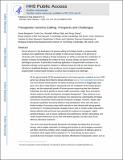| dc.contributor.author | Cox, David Benjamin Turitz | |
| dc.contributor.author | Platt, Randall Jeffrey | |
| dc.contributor.author | Zhang, Feng | |
| dc.date.accessioned | 2016-07-20T19:54:51Z | |
| dc.date.available | 2016-07-20T19:54:51Z | |
| dc.date.issued | 2015-02 | |
| dc.identifier.issn | 1078-8956 | |
| dc.identifier.issn | 1546-170X | |
| dc.identifier.uri | http://hdl.handle.net/1721.1/103783 | |
| dc.description | Available in PMC 2015 July 06 | en_US |
| dc.description.abstract | Recent advances in the development of genome editing technologies based on programmable nucleases have substantially improved our ability to make precise changes in the genomes of eukaryotic cells. Genome editing is already broadening our ability to elucidate the contribution of genetics to disease by facilitating the creation of more accurate cellular and animal models of pathological processes. A particularly tantalizing application of programmable nucleases is the potential to directly correct genetic mutations in affected tissues and cells to treat diseases that are refractory to traditional therapies. Here we discuss current progress toward developing programmable nuclease–based therapies as well as future prospects and challenges. | en_US |
| dc.description.sponsorship | Robert Metcalfe | en_US |
| dc.description.sponsorship | Simons Foundation | en_US |
| dc.description.sponsorship | Merkin Family Foundation for Stem Cell Research | en_US |
| dc.description.sponsorship | National Science Foundation (U.S.) (NSF Waterman Award) | en_US |
| dc.description.sponsorship | National Science Foundation (U.S.) (NSF Graduate Research Fellowship, grant number 1122374) | en_US |
| dc.description.sponsorship | National Institute of General Medical Sciences (U.S.) (Award number T32GM007753) | en_US |
| dc.description.sponsorship | National Institutes of Health (U.S.) ((NIH) Director’s Pioneer Award (DP1-MH100706)) | en_US |
| dc.description.sponsorship | W. M. Keck Foundation | en_US |
| dc.description.sponsorship | National Institute of Neurological Disorders and Stroke (U.S.) (NIH Transformative R01 grant (R01-NS 07312401)) | en_US |
| dc.description.sponsorship | Damon Runyon Cancer Research Foundation | en_US |
| dc.description.sponsorship | Searle Scholars Program | en_US |
| dc.description.sponsorship | Esther A. & Joseph Klingenstein Fund, Inc. | en_US |
| dc.description.sponsorship | Vallee Foundation | en_US |
| dc.language.iso | en_US | |
| dc.publisher | Springer Nature | en_US |
| dc.relation.isversionof | http://dx.doi.org/10.1038/nm.3793 | en_US |
| dc.rights | Creative Commons Attribution-Noncommercial-Share Alike | en_US |
| dc.rights.uri | http://creativecommons.org/licenses/by-nc-sa/4.0/ | en_US |
| dc.source | PMC | en_US |
| dc.title | Therapeutic genome editing: prospects and challenges | en_US |
| dc.type | Article | en_US |
| dc.identifier.citation | Cox, David Benjamin Turitz, Randall Jeffrey Platt, and Feng Zhang. "Therapeutic genome editing: prospects and challenges." Nature Medicine 21:2 (February 2015), pp.121-131. | en_US |
| dc.contributor.department | Harvard University--MIT Division of Health Sciences and Technology | en_US |
| dc.contributor.department | Massachusetts Institute of Technology. Department of Biological Engineering | en_US |
| dc.contributor.department | Massachusetts Institute of Technology. Department of Biology | en_US |
| dc.contributor.department | Massachusetts Institute of Technology. Department of Brain and Cognitive Sciences | en_US |
| dc.contributor.department | McGovern Institute for Brain Research at MIT | en_US |
| dc.contributor.mitauthor | Cox, David Benjamin Turitz | en_US |
| dc.contributor.mitauthor | Platt, Randall Jeffrey | en_US |
| dc.contributor.mitauthor | Zhang, Feng | en_US |
| dc.relation.journal | Nature Medicine | en_US |
| dc.eprint.version | Author's final manuscript | en_US |
| dc.type.uri | http://purl.org/eprint/type/JournalArticle | en_US |
| eprint.status | http://purl.org/eprint/status/PeerReviewed | en_US |
| dspace.orderedauthors | Cox, David Benjamin Turitz; Platt, Randall Jeffrey; Zhang, Feng | en_US |
| dspace.embargo.terms | N | en_US |
| dc.identifier.orcid | https://orcid.org/0000-0003-2782-2509 | |
| dc.identifier.orcid | https://orcid.org/0000-0001-7626-4254 | |
| mit.license | OPEN_ACCESS_POLICY | en_US |
| mit.metadata.status | Complete | |
